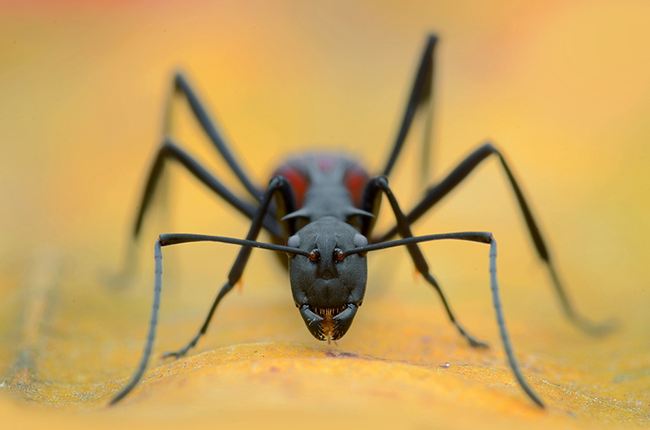Attack Of The Ants

Ant infestations are one of the most common domestic pest infestations. Arriving in swarms the insects invade kitchen areas in homes and offices across the country in search of food and shelter despite being more inclined towards sunnier climates (arent we all?) there are still a few types of Ants that reside in the UK ranging from the most commonly recognised Black ant or Garden ant to the Red ant and flying ants that plague our garden lawns!
Ants, like bees and wasps, always live in colonies which are headed by an egg-laying queen ant and consist of sterile 'worker' or 'soldier' females and short-lived male ants. They do however have a role to fulfil by dealing with dead and decaying organic materials, their nests aerate the soil and their presence on plant leaves can indicate aphid infestations.
This is all very well when they remain outside however, when they enter the home they live up to the name pest! Ants feed on a wide range of foods, including sweet, starchy and greasy foods, wood and most animal and plant materials. Unlike other insects, ants are more than satisfied with the human diet and will readily consume the same foods as humans and this is one of the main reasons that ants become a domestic nuisance. Food should always be kept in sealed containers and packets.
It is important to maintain a clean kitchen and home in order to prevent ants from entering the home. If a worker ant has found a good source for food, it leaves a trail of scent so that the other ants in the colony can find the food. This chemical signal survives for a long time and allows ants to find the food. Ants grow wings in the spring and it is at this time they are most likely to invade homes for food and to establish new nests.
Generally more active during the summer Ants which live inside the home or premises will establish their nest close to the food source and are more difficult to control. These ants can be present at any time of the year!
Preventing And Treating An Ant Infestation
The first and most important step is to stop your home from becoming an easy target for ants.
Regularly wipe down all worktops, sinks and any surfaces with which food has come in contact. Spray regularly with vinegar or a mild bleach solution. Sweep, mop and vacuum floors regularly. Don’t forget your pet food bowls on the floor too!Try and prevent or restrict entry! Block or seal any cracks and use deterrent substances such as talc and salt around any windows or doors which may allow entry. These create a barrier against the ants. Remember Ants do not like certain substances, including vinegar, black pepper, whole cloves and cinnamon. These products can also work effectively as natural deterrents.
Kill off any ants that you see. Harsh yes but very necessary. If you find a single ant, it is possible that she is only searching for a food source and has not yet laid a trail. Do what you can at this stage to locate the possible entry point and then create a deterrent barrier. Sticky tape and petroleum jelly also act as good short-term barriers. Vacuuming up the trail may also work, but it's important to dispose of the ants safely and ideally you need to eradicate the whole colony! Any colony which is not completely killed out, even if only 1% of ants survive, can return to its original size leaving you back at square one!
Baits can be useful for the nests of ants that live in the home, though they are not effective with all types of ants, particularly those that live in wood (e.g. carpenter ants). The best method to eradicate these is by locating and destroying the entire nest and ensuring that the queen does not survive. Carpenter ants nests are particularly difficult to find.
Nesting in rafters, furniture and any wood which has become wet or perhaps weathered they leave behind subtle clues i.e. small amounts of saw dust.Insecticides and bait treatments are used to eradicate the nest of ants outside. Baits must be taken back to the nest and be eaten by the ants in order to be effective and won't work if used in combination with an insecticide which kills the ant before she reaches the rest of the colony. Baits may take weeks to eradicate the nest.
Check Out These 5 Ant Facts
1. An estimated 20,000 species of ants exist in the world.
2. If a man could run as fast for his size as an ant can, he could run as fast as a racehorse.
3. The average life expectancy of an ant is 45-60 days.
4. Ants can lift 20 times their body weight.
5. Ants have been able to survive on the earth for more than 100 million years.
If you are still experiencing ant control problems then call a pest control professional immediately to remedy the problem today on: 0800 158 3885

